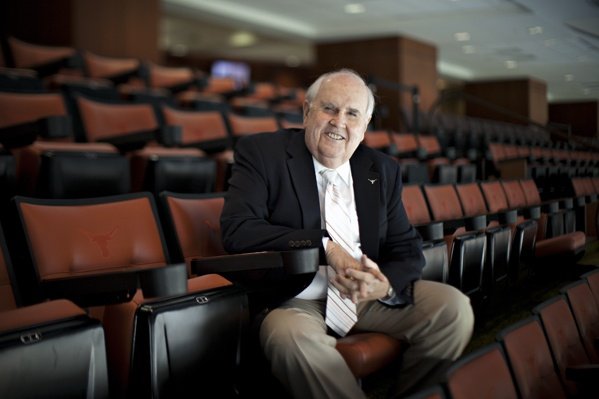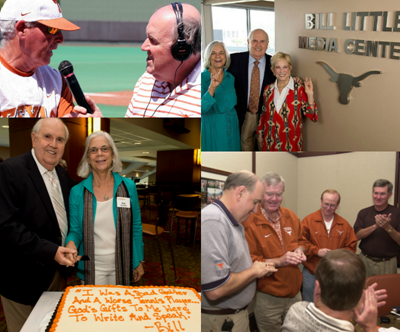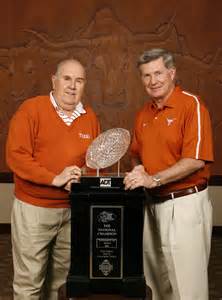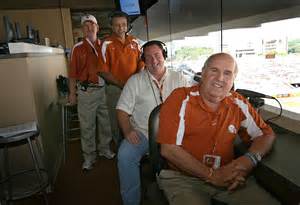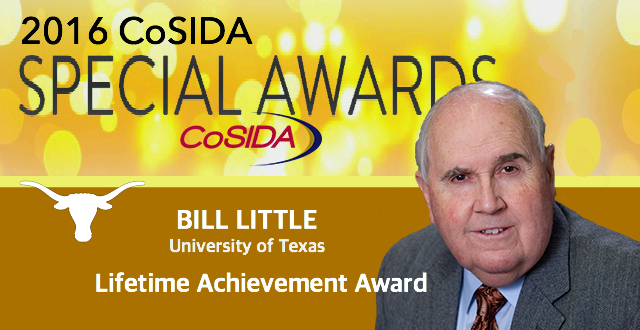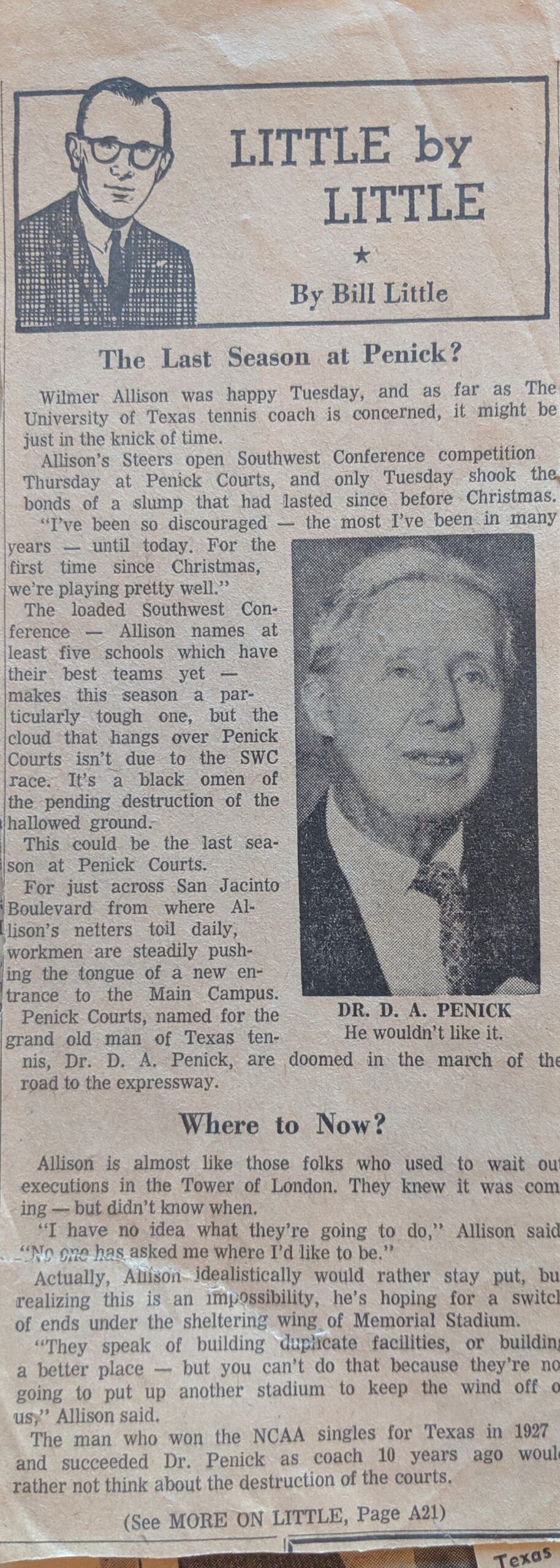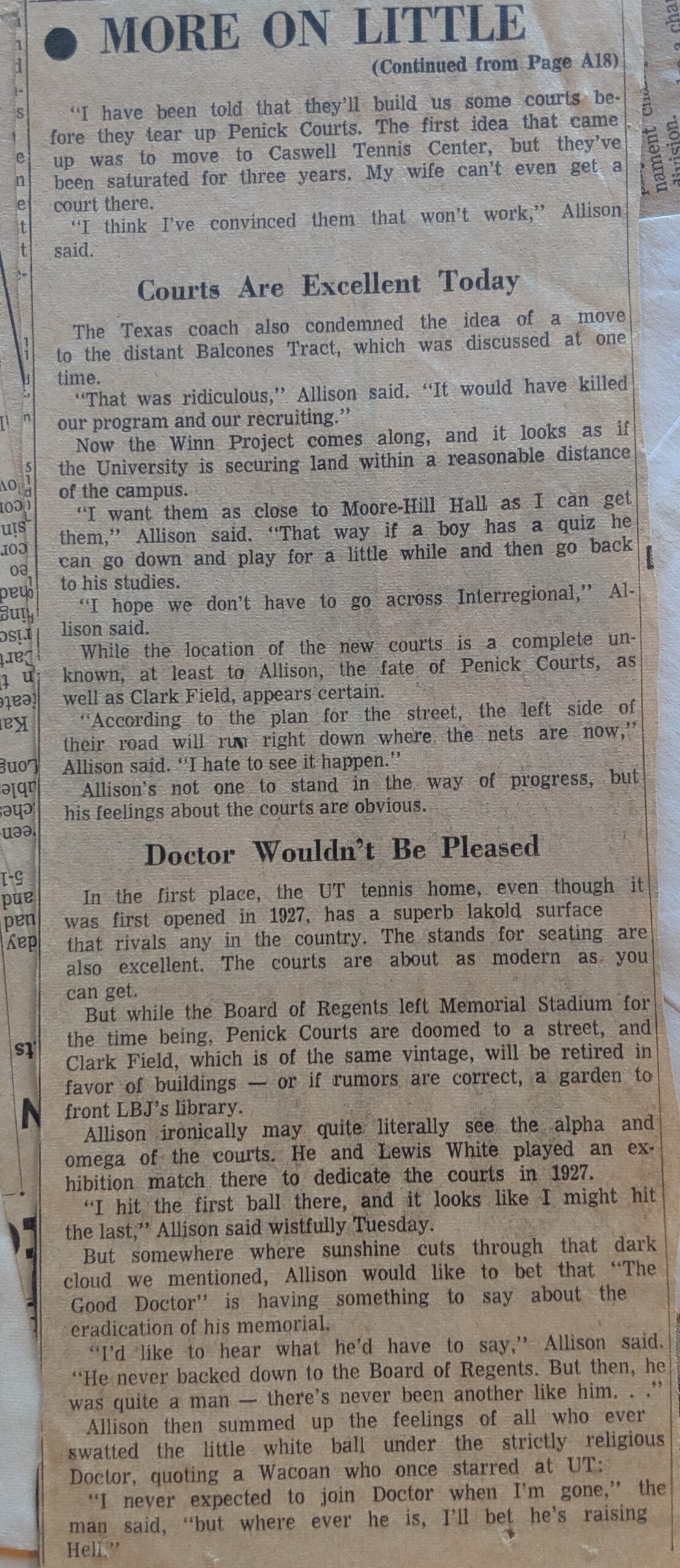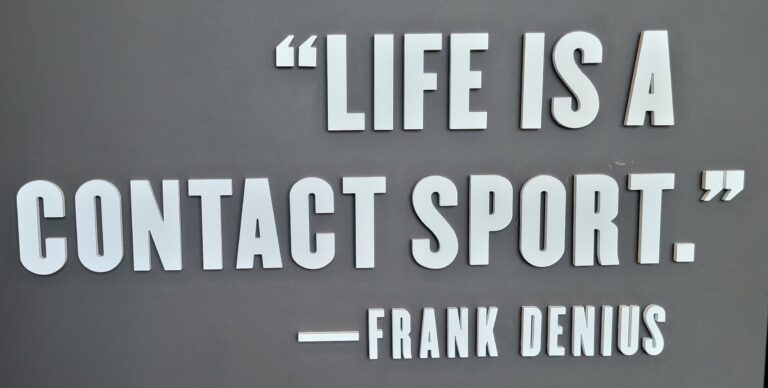Bill Little’s Bio
Bill Little- the writer -what is the question?
Bill Little is the Master longhorn Sports historian capturing the Heart Beat of the University of Texas. Bill says that college sports are “played by imperfect young people who are pieces of adults.” As a believer in the goodness of the human spirit, he uses his writing skills to capture the moments when these boys and girls turn to men and women.
Bill Little says in one of his Longhorn commentaries “I remember a story that was supposedly true about a great man of wisdom who came in to see a guy who was in his last moments. The man in the bed looked into the eyes of the philosopher and asked, “What’s the answer? What’s the answer?” The man of wisdom looked down and asked, “What’s the question?” And the guy died.
That is the supreme challenge for all authors is to define the question and deliver a passionate answer. Bill Little is a Yoda word master. Possessing a constellation of qualities that great wordsmiths need to deliver a message clearly and passionately. Great authors read all the time trying to define the question that needs to be answered. Once the author defines the question, he edits wisely and masterfully and connects the dots. Good writing connects things. Good writing tells a story that the reader can relate to.
To read many of Bill’s great works, start at the link below to find other links to other articles.
https://www.texaslsn.org/bill-little-articles-part-i
Bill Little’s bio.
Bill Little’s story about his love for the Longhorns is a family affair. In the early 1920’s W.E. Little, Bill Little’s father lettered in freshman tennis. Bill Little says on 8/08/2020, “ I remember seeing a photo of him with his freshman “T” letter white knit sweater, but I can’t remember if that was in the Cactus yearbook or an actual photo. He had a rare and wonderful experience. He came to UT as a freshman (they weren’t eligible for the varsity then). He earned his freshman tennis letter under Dr. Daniel Penick and played on the frosh baseball team for Billy Disch. He was trying to decide which sport to pursue. Mr. Disch told him that since he had already played enough to letter in tennis, he should stick with that, and he did.
Times were tough, and Bill’s father wound up heading home to Houston, where he finished his education by earning a BS degree from Rice in 1927. Bill says “ If I ever go back to UT and check the yearbooks, maybe I can find something (a photo). I have wished many times I had taken that index card and made a copy of it!!
Before joining Texas in 1968, Bill Little honed his writing skills working for the Winters Enterprise, San Antonio Standard-Times, Abilene News, the Daily Texan, Austin American Statesman, and the AP.
From 1968-2014 Bill Little continued to develop as a professional adding depth, discernment, and perception to his articles. In time he became the master writer, consummate storyteller, and premier media relations personality.
Leadership at UT – DKR, Fred Akers, David McWilliams, John Mackovic, Mike Perrin, and Deloss Dodds and professional sportswriters such as Kirk Bohls, Verne Lundquist, and Dan Jenkins- praise Bill for his extraordinary abilities to humanize special moments in UT sports history.
Mack Brown said Bill Little’s “love for the Longhorns and passion for his job is evident in how he tells the stories of Texas Athletics.”
Bill Little said, “I knew I loved journalism, and I knew I loved to tell the story.” “What I found in sports was the human element. It’s the conquest of the human spirit. It makes you love the game — whatever it is — and you cry with it, whether you win or lose.” “I always found that, if you can write something that can make a difference to somebody, it can change a life,”
His ability to emote Longhorn players’ human spirit and capture special moments in Longhorn sports history is the cornerstone of Bill Little writing style. As a “wordsmith,” he could articulate the moment the heart of a Longhorn player discovered through sports his/her destiny in life.
During His 50 Plus Years With The UT Athletic Department, Bill Little Assisted Five Head Football Coaches, Five Basketball Coaches, And Four Athletic Directors.
During his tenure at Texas, he attended 37 Longhorn Bowl games and 25 College World Series. He broadcast 1700 baseball games and many men’s and women’s basketball games. If this was not enough, Bill was the public address announcer at the Texas football games and was the author or co-author of 9 books about UT athletics.
Longhorn sports-inspired Bill Little, and his literary artistry influenced the sports world.
Bill Little honors.
-
The Lester Jordan Award “for exemplary service…and the promotion of the ideals of being a student-athlete.”
-
The FWAA Lifetime Achievement Award
-
The National Collegiate Baseball Writers Wilbur Snypp Award “for outstanding contributions to college baseball”
-
An inductee into the Hall of Honor,
-
Inductee into the CoSIDA Hall of Fame, and
-
Recipient of The Arch Ward Award for “inspiring excellence in and bringing dignity to the writing profession.”
Bill Little’s contributions to Longhorn heritage represent a portal to the past that reminds Longhorn fans that heritage shapes the present and empowers the future.
BEVO BEAT FOOTBALL
Longtime football SID Bill Little returning to Texas
Posted June 9th, 2016
Ryan Autullo American-Statesman Staff
Bill Little, who worked at Texas in media relations for 47 years, says he is returning to UT as a special assistant to athletic director Mike Perrin.
Little, whose name graces the press boxes at the football and baseball stadiums, told the American-Statesman the part-time position is to write commentary for the Longhorns’ official website, texassports.com, which he did before retiring in August 2014. Little’s appointment begins immediately, and he will be working for John Bianco, associate director for media relations.
“When Mike talked to me about the possibility of coming back, it was clear he felt that I could bring something to the table with a knowledge of the history of UT athletics,” Little said.
On Monday, Little will be in Dallas as one of 11 honorees for CoSIDA’s lifetime achievement award.
4/29/2016 11:09:14 AM
Special Awards Salute: Bill Little (Texas), Lifetime Achievement Award
• 2016 CoSIDA Special Awards general announcement/release
• Special Awards feature story schedule
by Jenna McEachern, www.burntorangebooks.com
Bill Little has been the face—and the voice—of Longhorn athletics for more than 50 years. Long before sports reporting turned digital, Little, as sports editor of the Daily Texan, was hammering out copy on a manual Royal typewriter.
After his 1964 graduation from UT, Bill spent two years writing for the Austin American-Statesman, then moved Bill Little throughout the years at the University of Texas.to Oklahoma City to write for The Associated Press. After two-years with the AP, Little returned home to Austin and to The University of Texas for good.
“I saw there was this really good job in public relations at The University of Texas,” Little said. “I called Coach Royal, and I said, ‘Coach, I want to come back.’ And he said, ‘I’d like to have you back.’ And that was the extent of it. I started that spring.”
It seems incredible that Darrell Royal hired 26-year-old Little as Texas’ assistant SID based only on a two-sentence interview. Yet Royal knew Little’s work, knew his character, knew he’d be loyal and and always professional. Royal’s assessment was on the money.
Inducted into the Longhorn Hall of Honor in 1993, Little served UT in many capacities: as assistant SID under the legendary Jones Ramsey, as Sports Information Director, then Special Assistant to the Athletic Director, Assistant AD for External Communications, then head of communications for Mack Brown. The job titles changed, but the office address stayed the same.
Little worked with five football coaches, five basketball coaches, and four athletic directors while at The University. Decades of Longhorn football, basketball, and baseball fans recognized that familiar voice over the Interviewing UT baseball coach Augie Garrido; at the dedication of the Bill Little Media Center
with wife Kim Scofield (l) and long-time friend and UT supporter Marian Dozier; with Kim
at his UT retirement cermony; receiving his “T” ring with the late football coach Darrell K
Royal, staffer Mike Arias and former football coach Mack Brown.public address system in stadiums and on radio broadcasts.
Little has worked 37 bowl games, and accompanied an NCAA record 25 teams to the College World Series in Omaha, and as of 2014, he holds the record for consecutive games worked by a Division I SID: 521. The string was almost broken when, just before the 1995 Sugar Bowl, he suffered a heart attack, but the ever-professional Little convinced doctors that he’d be under more stress in the hospital than he would if he attended the game. Streak intact.
Little’s legacy to The University is remarkable. He served as mentor and father figure to countless student-athletes through the years. CoSIDA’s Academic All-America Committee acknowledged Little’s influence on UT’s athletes by awarding him the Lester Jordan Award, “for exemplary service…and the promotion of the ideals of being a student-athlete.”
He’s been a good-will ambassador and host to hundreds of sportswriters and broadcasters who grew to love Austin and Tex-Mex while covering Longhorn athletic events. Young writers found encouragement, counsel, and occasionally, employment from the veteran journalist.
Little is the authority on UT Athletics history, and his award-winning columns and commentaries have left the Longhorn Athletic Department a written history–a vast archive–of its athletics programs and those who made it great. Little has authored or co-authored nine books on UT and college athletics.
“I always found that, if you can write something that can make a difference to somebody, it can change a life,” Little said. “I was a bad golfer and a worse tennis player. I wasn’t big enough to play football, and I was too short to play basketball, so my only gifts were to write and talk. If I was going to do what God put me on this planet to do, then I needed to do those things.”
Little attended his first CoSIDA workshop at the 1969 Chicago
meeting, then entered the officer rotation in Bill Little and Kim Scofield with nine of their 10 grandchildren.1985. As president in 1989, he presided over the first 1,000-person workshop in CoSIDA history. Named to the CoSIDA Hall of Fame in 1992, Little received the Arch Ward Award in 1998, for “inspiring excellence in and bringing dignity to our profession.”
He is one of the most decorated writers in the profession: The FWAA honored him with their Lifetime Achievement award, and the National Collegiate Baseball Writers awarded him the Wilbur Snypp award “for outstanding contributions to college baseball.”
Award-winning sports journalist Kirk Bohls called Little “the epitome of a knowledgeable, professional SID who had a rich background in journalism and who understood the balance of truth-telling and serving a university’s athletic program … the personification of UT athletics, there’s not a sportswriter or sportscaster in the country who didn’t work with and appreciate the contributions of Bill Little.”
Legendary broadcaster Verne Lundquist, the 2015 CoSIDA Jake Wade Award recipien, said,”I’ve known Bill since the early 1960’s which, having to put up with me for more than five decades, should alone qualify him for the COSIDA [Lifetime Achievement Award. Bill has been a consummate professional and a great friend over the years and this honor is richly deserved. Enjoy, Bill. Congratulations.”
He brought great honor to The University, to the profession he loves, and to himself. His influence is so great that the football and baseball press boxes at Texas are now named the “Bill Little Media Center,” a gift from longtime friend and UT athletics supporter Marian Dozier.
Bill’s wife, Kim Scofield, is also his advisor, editor, and travel companion and has been a true partner in his work. They have three children and ten grandchildren, all Longhorn fans.
Upon retirement in 2014 Little said, “Texas Athletics has pretty much been my life for close to 60 years. But now, I think I’ve earned the right to set my bucket down.” Still, Little continues as an advisor to the Athletics Department and broadcasts Longhorn baseball games.
Little’s longtime friend Dan Jenkins has the last word:
“If you want a guy to dive into a vat of burnt orange fluid and drown himself to achieve good print for the Longhorns, Bill Little is your man. He collected good journalism friends from all around the old Southwest Conference and now the Big 12. Why? Because he was always honest and enjoyed the success of other people and even, at times, of a Longhorn opponent. Bill comes from a long-forgotten time when a conference was like a family. Like Bill, those of us who knew such times still miss them.”
Bill Little, special assistant to the head football coach for communication, will retire Sunday after 46 years with the Texas athletics department. The football and baseball press boxes will be named the Bill Little Media Center in his honor.
Photo Credit: Lauren Ussery | Daily Texan Staff
TAGS
These tags are automatically generated. The Daily Texan does not guarantee their accuracy.
Published on August 28, 2014 at 10:35 pmLast update on August 28, 2014 at 10:58 pm
Seven years ago, Bill Little, special assistant to the head football coach for communication, made a promise to then-athletic director DeLoss Dodds and head football coach Mack Brown.
The longtime sports information director committed to stay at Texas for as long as Dodds and Brown did.
But, last January, just a few months away from turning 72, Little and his wife, Kim, realized that promise had been fulfilled.
“In January, I looked up, and both DeLoss and Mack were gone,” Little said. “A new group of people were coming in, and they needed their own people to do their own thing. So [Kim and I] said, in the words of Coach Royal, ‘Let’s just set our bucket down.’ And that’s what we decided to do.”
On Aug. 31, Little will retire, and, for the first time since 1968, he will no longer be an employee of Texas athletics.
The legendary wordsmith, who worked as a commentary writer and special assistant to Brown for the past seven years, saw the reigns of five football coaches, five basketball coaches and four athletic directors during his time in Austin. He attended 36 bowl games with the Longhorns and broadcasted more than 1,700 baseball games. Even Little’s honeymoon consisted of accompanying the Longhorns’ basketball team to New York during their NIT trip in 1978. But, after seeing six decades come and go at Texas, Little thought it was the perfect time to leave.
“It’s always hard to step away,” Little said. “But the timing was just perfect. I always said I never wanted to leave anywhere bitter, and that has always been important to me. The opportunity seemed right for the new administration — for Coach Strong and for everyone. It was a hard decision, but it was also an easy decision.”
Little grew up in Winters, a small town south of Abilene that encompasses under three square miles and has a population of just more than 2,500. After growing up a Longhorn fan, he followed in the footsteps of both his parents and began his college career at Texas in 1960.
As a student, he majored in journalism and worked in the sports information director’s office, creating a close friendship with football coach Darrell K Royal that would span until his death in 2012. In addition, he served as the sports editor of The Daily Texan for two years, witnessing Royal’s first national championship in 1963.
In 1968, at 26, Little started his full-time career at Texas as an assistant sports information director after a job interview that lasted just two sentences.
“I saw there was this really good job in public relations at the University of Texas,” Little said. “I called Coach Royal, and I said, ‘Coach, I want to come back.’ And he said, ‘I’d like to have you back.’ And that was the extent of it. I started that spring.”
Unknowingly, Little would spend the next 46 years involved in Texas sports. Ironically, though, sports weren’t Little’s passion. His passion stretched through sports to the stories that could be told and the people who were discovered through the game.
“I knew I loved journalism, and I knew I loved to tell the story,” Little said. “What I found in sports was the human element. It’s the conquest of the human spirit. It makes you love the game — whatever it is — and you cry with it, whether you win or lose.”
Little wanted to make a difference through his work and through his words.
“I always found that, if you can write something that can make a difference to somebody, it can change a life,” Little said. “I was a bad golfer and a worse tennis player. And I wasn’t big enough to play football, and I was too short to play basketball, so my only gifts were to write and talk. And, if I was going to do what God put me on this planet to do, then I needed to do those things.”
Little made that difference he was seeking and influenced so many around him that the football and baseball press boxes will now be named the Bill Little Media Center. A significant gift from longtime athletics supporter Marian Dozier created the funds to honor Little.
“It means so much to be able to honor my great friend Bill in this way,” Dozier said. “This naming will help honor his immense life work, the legacy he has left nationally on sports media and hopefully motivate young people to follow their passions in work and life.”
With his retirement approaching, Little — who has three children and ten grandchildren, all of whom are Texas fans — is ready to step away. He still hopes to stay involved with Texas athletics, though, by announcing home baseball games and doing radio work. He’s also written seven books on the Longhorns and hopes to finish a few more during his new free time.
“Texas athletics has pretty much been my life for close to 60 years,” Little said. “This fall will mark the first time since 1957 I haven’t covered football for somebody. But now, I think I’ve earned the chance to set my bucket down.”
A record that will never be broken
Bill Little holds the record for consecutive games working a Division I game. Before the 1995 Sugar Bowl, suffered a heart attack but chose to attend the game keeping his streak intact.
Click on Texassports.com and search Bill Little to read all of his articles celebrating Longhorn Sports’ history.
